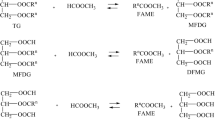Abstract
Rapeseed oil esters with lower aliphatic alcohols (C1−C4) were prepared in simple batch mode using an alkali (KOH) or acid (H2SO4) catalyst. The transesterification reaction conditions were optimized in order to obtain high yields of esters of the quality defined by standards for biodiesel fuels and for a short reaction time. Under these conditions it was possible to prepare only the methyl and ethyl esters catalyzed by KOH. Propyl and butyl esters were obtained only under acid catalysis conditions. The reaction catalyzed by H2SO4 was successfully accelerated using slightly higher catalyst concentrations at the boiling points of the alcohols used. The branched-chain alcohols reacted more slowly than their linear homologs, while t-butanol did not react at all. It was also possible to transesterify rapeseed oil using a mixture of alcohols characteristic of the end products of some fermentation processes (e.g., the acetone-butanol fermentation). A simple calculation was made which showed that, because of the higher price of longer-chain alcohols and because of the more intensive energy input during production the esters of these alcohols, they are economically unfavorable as biodiesel fuels when compared with the methyl ester.
Similar content being viewed by others
References
Meyer, C., R. Stern, and J. C. Guibet, Esters from Vegetable Oils as Substitutes for Diesel Fuels, in Proceedings, VIII International Symposium on Alcohol Fuels, November 13–16, 1988, Tokyo, Japan, pp. 137–142.
Dohne, E., Pflanzenöl als Motortreibstoff, Agrartechnik Würzburg 66:16–23 (1987).
Vellguth, G., Field Test of a DI-Diesel Tractor with Methylester of Rape Oil as Alternative Fuel, in Proceedings of the International Conference on Bioenergy, edited by H. Egneus and A. Ellegard, Vol. IV: Bioenergy Utilisation, Elsevier, London, 1984, pp. 215–222.
Leifert, K.J., Zukunftsperspektiven der Erzeugung und Verwendung von Pflanzenöl als Motortreibstoff in der EU, Verlag Lang, Frankfurt/M, Germany, 1996.
Goering, C.E., and B. Fry, Engine Durability Sereening Tests of a Diesel Oil/Soy Oil/Alcohol Microemulsion Fuel, J. Am. Oil. Chem. Soc. 61:1627–1632 (1984).
Schwab, A.W., H.C. Nielsen, D.D. Brooks, and E.H. Pryde, Triglyceride/Aqueous Ethanol/1-Butanol Microemulsions, J. Disp. Sci. Technol. 4:1–17 (1983).
Mittelbach, M., Herstellung von Fettsäuremethylestern und deren Verwendung als Dieselkraftstoff, Österreichische Chemie-Zeitschrift 90:147–150 (1989).
Mittelbach, M., M. Wörgetter, and J. Pernkopf, Diesel Fuel Derived from Vegetable Oils: Preparation and Use of Rape Oil Methyl Ester, Energy Agric. 2:369–384 (1983).
Kildiran, G., S. Özgul, and S. Türkay, In-situ Alcoholysis of Soybean Oil, J. Am. Oil. Chem. Soc. 73:225–228 (1996).
Freedman, B., R.O. Butterfield, and E.H. Pryde, Transesterification Kinetics of Soybean Oil, ——Ibid. 63:1375–1380 (1986).
Nye, M.J., T.W. Williamson, S. Deshpande, J.H. Schrader, W.H. Snively, T.P. Yurkewich, and C.L. French, Conversion of Used Frying Oil to Diesel Fuel by Transesterification: Preliminary Tests, ——Ibid. 60:1598–1601 (1983).
Mittelbach, M., Die Erzeugung von Monoestern der fetten Öle, in Symposium Rapsmethylester-Kraftstoff und Rohstoff, edited by H. Schindlbauer, Gesellschaft Österreichischer Chemiker, Vienna, 1992, pp. 161–168.
Freedman, B., E.H. Pryde, and T.L. Mounts, Variables Affecting the Yields of Fatty Esters from Transesterified Vegetable Oils, J. Am. Oil Chem. Soc. 61:1638–1643 (1984).
Gauglitz, E.J., and L.W. Lehman, The Preparation of Alkyl Esters from Highly Unsaturated Triglycerides,——Ibid. 40:197–198 (1962).
Official Methods and Recommended Practices of the American Oil Chemists' Society, 4th edn., American Oil Chemists' Society, Champaign, 1989.
Gapes, J.R., D. Nimcevic, and A. Friedl, Long-Term Continuous Cultivation of Clostridium beijerinckii in a Two-Stage Chemostat with On-Line Solvent Removal, Appl. Environ. Microbiol. 62:3210–3219 (1996).
Jones, D.T., and D.R. Woods, Acetone-Butanol Fermentation Revisited, Microbiol. Rev. 50:484–524 (1986).
Klopfenstein, W.E., and H.S. Walker, Efficiencies of Various Esters of Fatty Acids as Diesel Fuels, J. Am. Oil Chem. Soc. 60:1596–1598 (1983).
Wheeler, W.B., Refrigerant System Lubricant and Method, U.S. Patent 5,750,046 (1998).
Killick, R.W., Corn Drying Compositions, U.S. Patent 5,049,192 (1991).
Author information
Authors and Affiliations
Corresponding author
About this article
Cite this article
Nimcevic, D., Puntigam, R., Wörgetter, M. et al. Preparation of rapeseed oil esters of lower aliphatic alcohols. J Amer Oil Chem Soc 77, 275–280 (2000). https://doi.org/10.1007/s11746-000-0045-1
Received:
Accepted:
Issue Date:
DOI: https://doi.org/10.1007/s11746-000-0045-1




